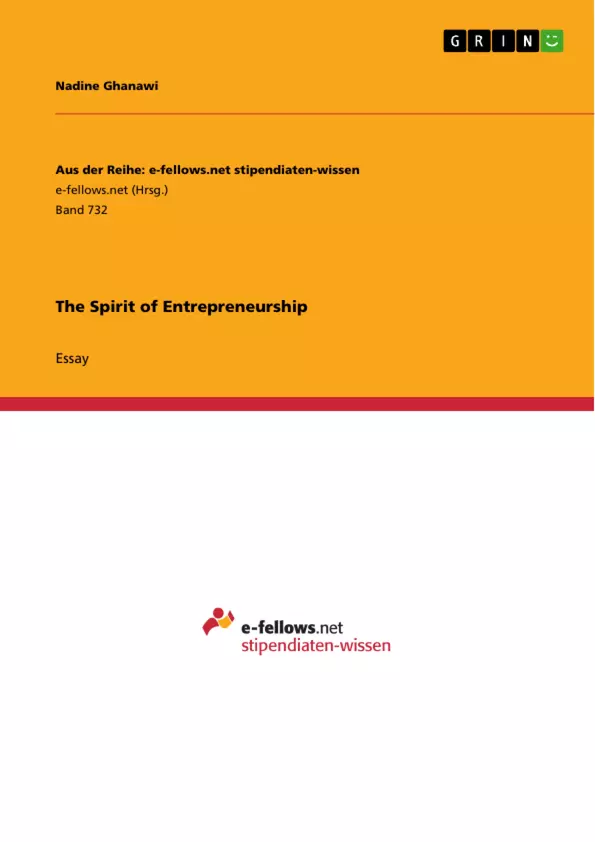Entrepreneurship as a study has been pioneered particularly since the middle of the 20th century.1 Nowadays, it has become a widespread subject among business schools, management scholars and researchers––with literature abounding. But also in practice, many governments have already recognized the value of entrepreneurship for the economy by offering plenty of Entrepreneurial Development Programs. Therefore, not only economists and businesspeople, but also especially sociologists and psychologists ask themselves what actually is an entrepreneur.
Is it¬¬––as the earliest French writer on entrepreneurship, Richard Cantillion, suggests––someone who takes risk for a profit?2 A capitalist and agent of economic progress as understood by English classical economists such as Smith or Bentham? A consummate innovator as epitomized by the Austrian School legacy with Schumpeter as its greatest proponent? Or simply all of it?
Indeed, entrepreneurship is fundamentally personal. That is why one cannot give an exact definition of the entrepreneur. However, there is a general belief that an entrepreneur’s personality traits can be essential for the success of a new venture. Still, the entrepreneurial psychology or mindset––what we will call the spirit of entrepreneurship¬¬––has not been thoroughly studied hitherto.3
In order to call attention to the individual differences that make or break entrepreneurs, this paper is adapting a personal approach to this topic basing its insights mainly on interviews with two successful entrepreneurs: Michel Hamou, Managing Director and co-founder of Alti SA, an information technology (IT) services company in France that has just been acquired by India’s largest outsourcer Tata Consultancy Services (TCS); and Michaël Cohen, co-founder of Bagel Corner, a French fast food chain with a global vision. Both interviews helped to shape the idea of what an entrepreneur really is, the competencies, cognitions and behaviors he or she should reveal, and, in turn, to unmask common stereotypes about entrepreneurship. With those insights, we will be able to develop an entrepreneurial formula, so as to finally establish a personal definition of the spirit of entrepreneurship.
Inhaltsverzeichnis
- I Introduction to the Companies and its Entrepreneurs
- Alti SA
- Bagel Corner
- II The Entrepreneurial Formula
- Partnership
- Vision
- Confidence
- Passion
- Competence
- Endurance
- III Conclusions
- IV References
Zielsetzung und Themenschwerpunkte
Diese Arbeit beschäftigt sich mit dem Unternehmergeist und untersucht, welche Eigenschaften und Fähigkeiten ihn ausmachen. Basierend auf Interviews mit zwei erfolgreichen Unternehmern, Michel Hamou und Michaël Cohen, werden die wesentlichen Komponenten des Unternehmergeistes beleuchtet. Ziel ist es, einen persönlichen Blick auf dieses Thema zu werfen und die spezifischen Herausforderungen und Stärken von Unternehmern aufzuzeigen. Die Arbeit analysiert die Rolle von Faktoren wie Partnerschaft, Vision, Vertrauen, Leidenschaft, Kompetenz, Ausdauer und Belastbarkeit im Kontext des Unternehmertums.
- Die Rolle von Partnerschaft im Unternehmertum und das Spannungsverhältnis zwischen Kooperation und Konkurrenz.
- Die Bedeutung von Vision und die Fähigkeit, Trends und zukünftige Entwicklungen zu antizipieren.
- Die Herausforderungen und Chancen, die mit dem Aufbau und der Aufrechterhaltung von Selbstvertrauen und Vertrauen in der Außenwelt verbunden sind.
- Die Frage, ob Leidenschaft ein Muss für Unternehmer ist und wie sie sich im Kontext der Geschäftsführung auswirkt.
- Die Wichtigkeit von Kompetenz und die Fähigkeit, neue Kenntnisse und Fähigkeiten zu erlernen.
Zusammenfassung der Kapitel
I. Introduction to the Companies and its Entrepreneurs
Dieses Kapitel stellt die beiden Unternehmen Alti SA und Bagel Corner sowie deren Gründer, Michel Hamou und Michaël Cohen, vor. Es beschreibt die jeweiligen Geschäftsfelder, die Entstehungsgeschichte der Unternehmen und die wichtigsten Herausforderungen und Erfolge. Zudem werden die Unternehmer selbst charakterisiert und ihre persönlichen Erfahrungen im Detail beleuchtet.
II. The Entrepreneurial Formula
Dieses Kapitel analysiert die wichtigsten Komponenten, die den Unternehmergeist ausmachen. Es werden verschiedene Aspekte wie Partnerschaft, Vision, Vertrauen, Leidenschaft, Kompetenz und Ausdauer im Detail beleuchtet und auf ihre Bedeutung für das Unternehmertum eingegangen. Die Ergebnisse der Interviews mit Michel Hamou und Michaël Cohen dienen dabei als Grundlage für die Analyse.
Schlüsselwörter
Die Arbeit konzentriert sich auf die folgenden Schlüsselwörter: Unternehmergeist, Unternehmertum, Persönlichkeit, Fähigkeiten, Partnerschaft, Vision, Vertrauen, Leidenschaft, Kompetenz, Ausdauer, Belastbarkeit, Interview, Case Study, Alti SA, Bagel Corner, Michel Hamou, Michaël Cohen.
Häufig gestellte Fragen
Was macht den "Spirit of Entrepreneurship" aus?
Es handelt sich um eine psychologische Einstellung oder ein Mindset, das durch Merkmale wie Vision, Leidenschaft, Ausdauer und Risikobereitschaft geprägt ist.
Ist Leidenschaft eine notwendige Voraussetzung für Unternehmer?
Die Arbeit untersucht, ob Leidenschaft ein "Muss" ist und wie sie sich auf die langfristige Führung eines Unternehmens auswirkt.
Welche Rolle spielen Partnerschaften für den Erfolg?
Partnerschaften werden im Hinblick auf das Spannungsverhältnis zwischen Kooperation und Konkurrenz sowie als wichtige Stütze für das Wachstum analysiert.
Können unternehmerische Fähigkeiten erlernt werden?
Die Arbeit thematisiert die Wichtigkeit von Kompetenz und die Fähigkeit eines Unternehmers, ständig neue Kenntnisse zu erwerben.
Wer sind die Fallbeispiele in dieser Arbeit?
Die Analyse basiert auf Interviews mit Michel Hamou (Alti SA) und Michaël Cohen (Bagel Corner).
- Quote paper
- International Master of Business Administration Nadine Ghanawi (Author), 2013, The Spirit of Entrepreneurship, Munich, GRIN Verlag, https://www.grin.com/document/229421



